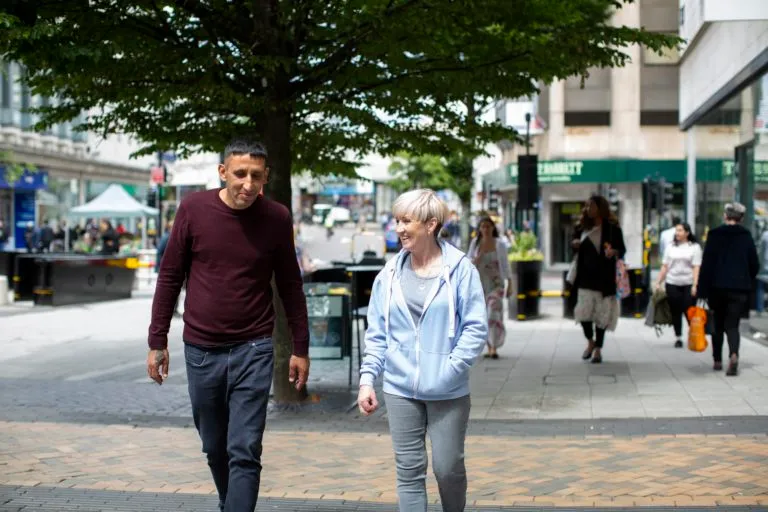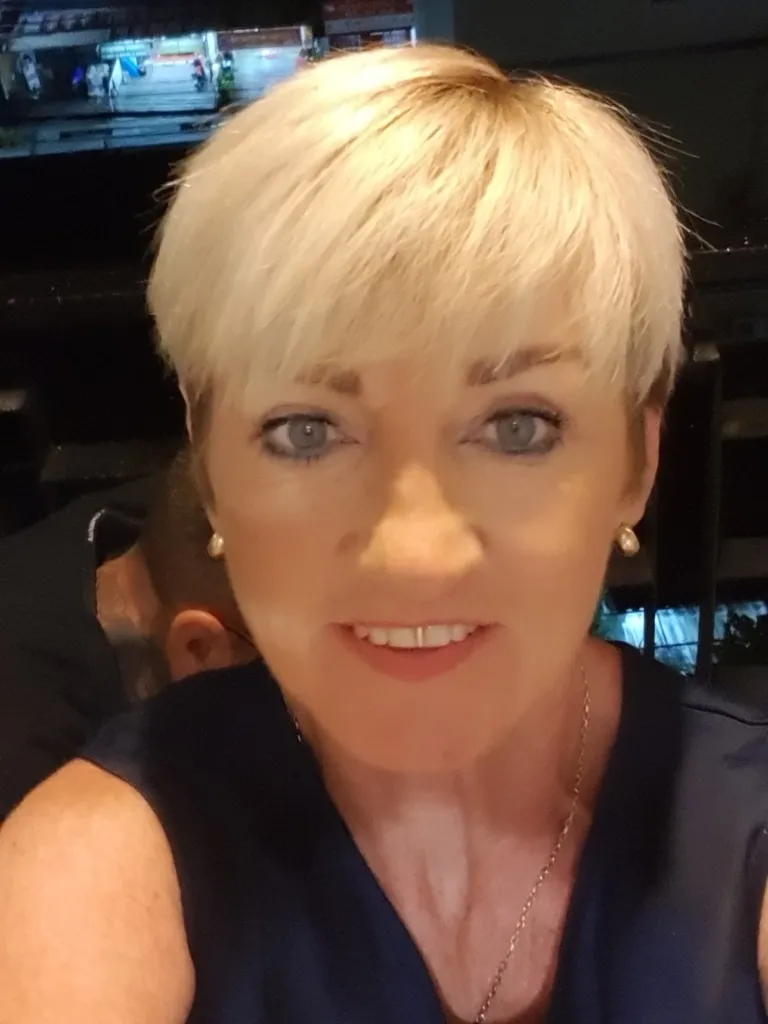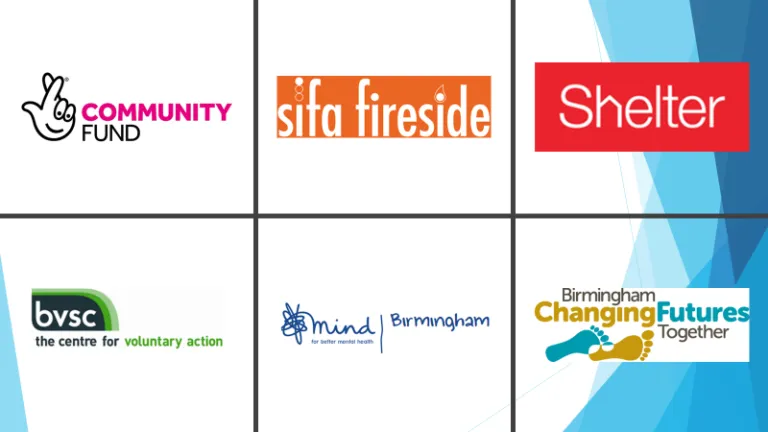Shelter’s Lead Worker/Peer Mentor service: how can we continue this vital work?
Published: by Guest blog

Colette Carter on her experiences working as part of Shelter’s Lead Worker/Peer Mentor service.
Hi, my name is Colette and I am cautiously attempting to add another string to my bow by writing my very first blog. Some of you may know me from the Birmingham Shelter office, or the short film, Colette and Paddy – that’s me.

A blog is something that should be personal to the writer.
Maybe that’s why I have been asked to write this – as I was a part of the Lead Worker/Peer Mentor service from inception to its conclusion in June 2019. I am as passionate today as I was when I turned up for my first day as a Peer Mentor at Shelter, in March 2015.
What is the Lead Worker/Peer Mentor service?
The Lead Worker/Peer Mentor (LW/PM) service was formed with the help of people who, just like me, had experienced the traumas of homelessness, addiction, offending and mental health – known today as multiple and complex needs (MCNs). We had all managed to escape the traumas of our past and were ready and eager to answer questions about the services we had used, and more to the point, highlight what was wrong with them. We all had PHDs from the University of Life, and knew exactly what we would change for the better.
So, like excited school children sitting in front of their teachers – only ours were the commissioners of the Birmingham Voluntary Service Council (BVSC) – our arms shot up into the air (to stop us all shouting out at once) each time a question was asked. The BVSC were hosting the question and answer sessions as part of the Making Every Adult Matter (MEAM) partnership. There was a pot of money from The National Lottery Community Fund that could be used in Birmingham to improve services.
Whoever it was that thought to ask ex-service users for their views should be delighted with the outcome. We revelled in the opportunity. I mean, who better to ask how to improve a service, than someone who had used it? And we all had for many years. I had been trapped in my own trauma of addiction for 30 years, so between us, we had a vast number of years’ experience and knowledge, and were certain we were the face of change for others who were still experiencing multiple and complex needs.
Our partnerships
Shelter, in partnership with Birmingham Mind, the national Mental Health group, and Sifa Fireside (a local charity established for many years in Birmingham who offer help and a warm meal to the homeless), together became Birmingham Changing Futures Together (BCFT), with the help of the National Lottery Community Fund. BCFT named one of their projects the Lead Worker/Peer Mentor service.

The model was structured around two variables. Model 1: Twelve Lead Workers (LW) were employed. These were seasoned support workers and came from all areas including, NHS, Social Services and Mental Health. They all had extensive knowledge of the services required to support MCNs. Six Peer Mentor’s (PM) were employed to work in partnership with a LW. Peer Mentors were helping clients to stay engaged, using empathy, identification and inspiration. When I used to hear, ‘but you don’t know what it’s like’ from clients, watching their facial expressions change to amazement, but normally disbelief, when I disclosed my past always made me smile.
So, what about the other six Lead Workers, I hear you ask? They worked on their own in a support capacity without help from any Peer Mentors. That was Model 2. Both models supported clients with MCNs, and both collected monthly data that was sent to the national evaluation team at CFE. The data collected was evaluated, and after two years, guess whose clients had faster and more purposeful outcomes? Model 1, of course. For those of us who were part of that small group some years before, we felt like the cat that got the cream. At last, published statistics proving that we had made a difference – although instinctively, we had known that all along.
How our approach made a difference
How were we so different to generic support? We believed in a multi-agency approach for each individual client. After identifying their needs, the Lead Worker would contact and arrange meetings with the relevant staff from a multitude of services and agencies. The Peer Mentor engaged and communicated with the clients in only a way a peer can. For the first time in many years, someone was taking a true interest in them. Someone who didn’t want anything from them like their associates did. Someone who was willing to accept them as they stood, without fear of judgement, embarrassment and shame, and who would advocate on their behalf –because we had that mutual understanding.
We felt their pain, their trauma, the predicament they were in, and we had the ‘magic’, which was TLC. Because of this, the clients put their trust in us. Imagine the burden that could have been? Someone who has been let down by family, friends, services and establishments for most of their lives, suddenly gives you their trust. But we didn’t perceive it as a burden. We needed their trust, and it was a huge leap in the right direction. Clients were not time-restrained – they led their own support plans. They could engage and disengage to suit, and they could receive support for the duration of the project.
No exclusions
Clients were never excluded from our service, as we were designed to support those who had been previously excluded from most other services, or fallen through service gaps. For the most part, they felt like they had become non-entities, a statistic. But beneath the façade was a human being. Who, before the Lead Workers and Peer Mentors came along, had resigned themselves to life in a dirty shop doorway, as no-one they had ever known had got better, got off the streets, or managed to eradicate the thoughts that were mental torture.
The unison of Lead Workers and Peer Mentors was unique and innovative. The working bond was an extension and combination of professionalism and true caring. We could find ourselves sitting in A&E until 10pm – or later if we had to – even though our hours were 9am–5pm. Good management allowed us to do this. We would make prison visits and write letters. We visited mental health wards.
When someone starts to feel cared for, have an identity and feel valued like a true human being for the first time in years, it gives them the power to propel positive changes, no matter how small. We didn’t raid the streets pursuing rough sleepers. They came to us freely and wanted to improve some parts of their lives. Most eventually managed to sustain a structured lifestyle, some managed to totally change their lives, and one even gained employment with Shelter as a Peer Mentor. Amazing!
Saying goodbye
Sadly, some clients died along the way. Having to arrange a client’s funeral as I was noted as next of kin was upsetting, but a privilege and an honour. Without us, he would have gone to his grave totally alone. As he arrived (on time, for the very first time and last time) in a state-of-the-art hearse, we did laugh, as Christopher would have. His coffin was draped in two lovely wreaths, one from Shelter and the other from the wider LW/PM team. We chose tunes rather than hymns, and I gave the eulogy. He went out to My Way by the Sex Pistols. Very befitting. All too often, Lead Workers and Peer Mentors were listed as next of kin. When we were in the service’s exit strategy, my Lead Worker and I visited the gardens of peace to say one last goodbye.
So here I am today, having progressed from a Peer Mentor to a Lead Worker, to my most recent post, Development Officer in the Continuation Strategy Team. Continuing to promote the Lead Worker/Peer Mentor model to services within Birmingham. Hoping to pass my passionate message – and the statistics of course – to decision-makers and commissioners. I want them to adopt this fantastic model within their services. A model that works holistically and financially to benefit those with Multiple and Complex needs, saving lives, saving money.
If you would like any further information on the Continuation Strategy or LW/PM Service, please email Colette Carter (Colette_Carter@shelter.org.uk), or Christine Grover (Christine_Grover@shelter.org.uk).
To hear more about the Lead Worker/Peer Mentor service, listen to Shelter’s brand new podcast series, or read about how we worked with Shelter client, Tara.